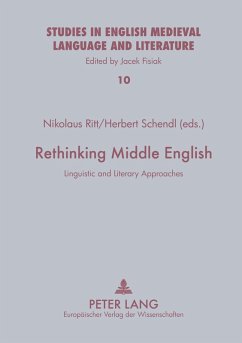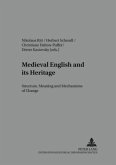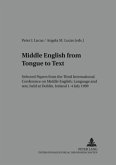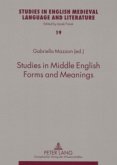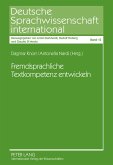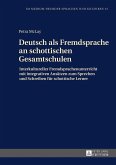Rethinking Middle English
Linguistic and Literary Approaches
Herausgegeben:Ritt, Nikolaus; Schendl, Herbert
Rethinking Middle English
Linguistic and Literary Approaches
Herausgegeben:Ritt, Nikolaus; Schendl, Herbert
- Broschiertes Buch
- Merkliste
- Auf die Merkliste
- Bewerten Bewerten
- Teilen
- Produkt teilen
- Produkterinnerung
- Produkterinnerung
This volume presents Middle English studies as a modern discipline which unites linguistics, literature, philology, the history of ideas, textual studies including recent developments in the study of text types and genres, as well as the sociohistorical perspective. This large variety of both traditional and new approaches is mirrored in the four main parts of the book, starting with texts and text types, and moving on to vocabulary, syntax and morphology, and finally phonology and orthography. Aspects of language contact as well as corpus linguistic studies are also addressed in a number of…mehr
Andere Kunden interessierten sich auch für
![Medieval English and its Heritage Medieval English and its Heritage]() Medieval English and its Heritage64,95 €
Medieval English and its Heritage64,95 €![Middle English from Tongue to Text Middle English from Tongue to Text]() Middle English from Tongue to Text104,20 €
Middle English from Tongue to Text104,20 €![Studies in Middle English Forms and Meanings Studies in Middle English Forms and Meanings]() Studies in Middle English Forms and Meanings92,95 €
Studies in Middle English Forms and Meanings92,95 €![Fremdsprachliche Textkompetenz entwickeln Fremdsprachliche Textkompetenz entwickeln]() Fremdsprachliche Textkompetenz entwickeln71,80 €
Fremdsprachliche Textkompetenz entwickeln71,80 €![Muster und Variation Muster und Variation]() Muster und Variation60,50 €
Muster und Variation60,50 €![Deutsch als Fremdsprache an schottischen Gesamtschulen Deutsch als Fremdsprache an schottischen Gesamtschulen]() Petra McLayDeutsch als Fremdsprache an schottischen Gesamtschulen67,75 €
Petra McLayDeutsch als Fremdsprache an schottischen Gesamtschulen67,75 €![Da haben wir den Salat! Da haben wir den Salat!]() Rolf-Bernhard EssigDa haben wir den Salat!14,00 €
Rolf-Bernhard EssigDa haben wir den Salat!14,00 €-
-
-
This volume presents Middle English studies as a modern discipline which unites linguistics, literature, philology, the history of ideas, textual studies including recent developments in the study of text types and genres, as well as the sociohistorical perspective. This large variety of both traditional and new approaches is mirrored in the four main parts of the book, starting with texts and text types, and moving on to vocabulary, syntax and morphology, and finally phonology and orthography. Aspects of language contact as well as corpus linguistic studies are also addressed in a number of contributions. Authors are leading experts in their fields, and come from the United States, South Africa, and all parts of Europe.
Produktdetails
- Produktdetails
- Studies in English Medieval Language and Literature 10
- Verlag: Peter Lang
- Artikelnr. des Verlages: 52032
- Seitenzahl: 344
- Englisch
- Abmessung: 19mm x 148mm x 210mm
- Gewicht: 470g
- ISBN-13: 9783631520321
- ISBN-10: 3631520328
- Artikelnr.: 27770775
- Herstellerkennzeichnung Die Herstellerinformationen sind derzeit nicht verfügbar.
- Studies in English Medieval Language and Literature 10
- Verlag: Peter Lang
- Artikelnr. des Verlages: 52032
- Seitenzahl: 344
- Englisch
- Abmessung: 19mm x 148mm x 210mm
- Gewicht: 470g
- ISBN-13: 9783631520321
- ISBN-10: 3631520328
- Artikelnr.: 27770775
- Herstellerkennzeichnung Die Herstellerinformationen sind derzeit nicht verfügbar.
The Editors: Nikolaus Ritt studied, and now teaches English linguistics at the University of Vienna. He was visiting professor at Eötös Lorand University, Budapest and Adam Mickiewicz University, Poznan. He is presently developing a memetic framework for the study of language change.
Herbert Schendl studied English and French philology in Vienna and Paris. He is Professor of English linguistics at the University of Vienna. Major research interests include EModE variation, language contact and historical code-switching.
Herbert Schendl studied English and French philology in Vienna and Paris. He is Professor of English linguistics at the University of Vienna. Major research interests include EModE variation, language contact and historical code-switching.
Contents: Herbert Schendl/Nikolaus Ritt: Introduction - Derek Brewer: Understanding chivalry in earlier English literature - David Mills: Playing the Show, showing the Play: the Chester Plays in search of a genre - George R. Keiser: Robert Thornton's Liber de Diversis Medicinis: text, vocabulary, and scribal confusion - Frances McSparran: Following the scribal trail: the BL Cotton Caligula A. ix copy of LaZamon's Brut - Christian Liebl: Two unnoticed Early ME versions of Candet Nudatum Pectus - Joanna Bugaj: Middle Scots burgh court records: the influence of the text type on its linguistic features - Irma Taavitsainen: Standardisation, house styles, and the scope of variation in ME scientific writing - Hans-Jürgen Diller: Chaucer's emotion lexicon: passioun and affeccioun - Przemyslaw Lozowski: Polysemy in context: meten and dremen in Chaucer - Rafal Molencki: The confusion between thurven und durren in Middle English - Tibor rsi: Ways and means of French lexical influence in the Cotton version of Mandeville's Travels - Thomas Honegger: 'wyZe welcum iwys to this place' - and never mind the alliteration: an inquiry into the use of forms of address in two alliterative ME romances - Cynthia Lloyd: Experience or experiment? Some distinctions between French nominal suffixes in Middle English - Maurizio Gotti: Prediction in Middle English: a comparison between shall und will - Lilo Moessner: The verbal syntagm in ME conditional clauses - Letizia Vezzosi: The development of himself in Middle English: a 'Celtic' hypothesis - Hans Platzer: The development of natural gender in Middle English, or: sex by accident - Donka Minkova/Robert Stockwell: Clash avoidance in morphologically derived words in Middle English. (Why [-hUd] but [-dm]?) - Roger Lass/Margaret Laing: Are front rounded vowels retained in West Midland Middle English? - Merja Stenroos: Spelling conventions and rounded front vowels in the poems of William Herebert - Albertas Steponavicius: The Great Vowel Shift as a paradigmatic restructuring of the Late ME vowel system - Jerzy Welna: Now you see it, now you don't, or the fates of the ME voiced labial stop in homorganic clusters.
Contents: Herbert Schendl/Nikolaus Ritt: Introduction - Derek Brewer: Understanding chivalry in earlier English literature - David Mills: Playing the Show, showing the Play: the Chester Plays in search of a genre - George R. Keiser: Robert Thornton's Liber de Diversis Medicinis: text, vocabulary, and scribal confusion - Frances McSparran: Following the scribal trail: the BL Cotton Caligula A. ix copy of LaZamon's Brut - Christian Liebl: Two unnoticed Early ME versions of Candet Nudatum Pectus - Joanna Bugaj: Middle Scots burgh court records: the influence of the text type on its linguistic features - Irma Taavitsainen: Standardisation, house styles, and the scope of variation in ME scientific writing - Hans-Jürgen Diller: Chaucer's emotion lexicon: passioun and affeccioun - Przemyslaw Lozowski: Polysemy in context: meten and dremen in Chaucer - Rafal Molencki: The confusion between thurven und durren in Middle English - Tibor rsi: Ways and means of French lexical influence in the Cotton version of Mandeville's Travels - Thomas Honegger: 'wyZe welcum iwys to this place' - and never mind the alliteration: an inquiry into the use of forms of address in two alliterative ME romances - Cynthia Lloyd: Experience or experiment? Some distinctions between French nominal suffixes in Middle English - Maurizio Gotti: Prediction in Middle English: a comparison between shall und will - Lilo Moessner: The verbal syntagm in ME conditional clauses - Letizia Vezzosi: The development of himself in Middle English: a 'Celtic' hypothesis - Hans Platzer: The development of natural gender in Middle English, or: sex by accident - Donka Minkova/Robert Stockwell: Clash avoidance in morphologically derived words in Middle English. (Why [-hUd] but [-dm]?) - Roger Lass/Margaret Laing: Are front rounded vowels retained in West Midland Middle English? - Merja Stenroos: Spelling conventions and rounded front vowels in the poems of William Herebert - Albertas Steponavicius: The Great Vowel Shift as a paradigmatic restructuring of the Late ME vowel system - Jerzy Welna: Now you see it, now you don't, or the fates of the ME voiced labial stop in homorganic clusters.

